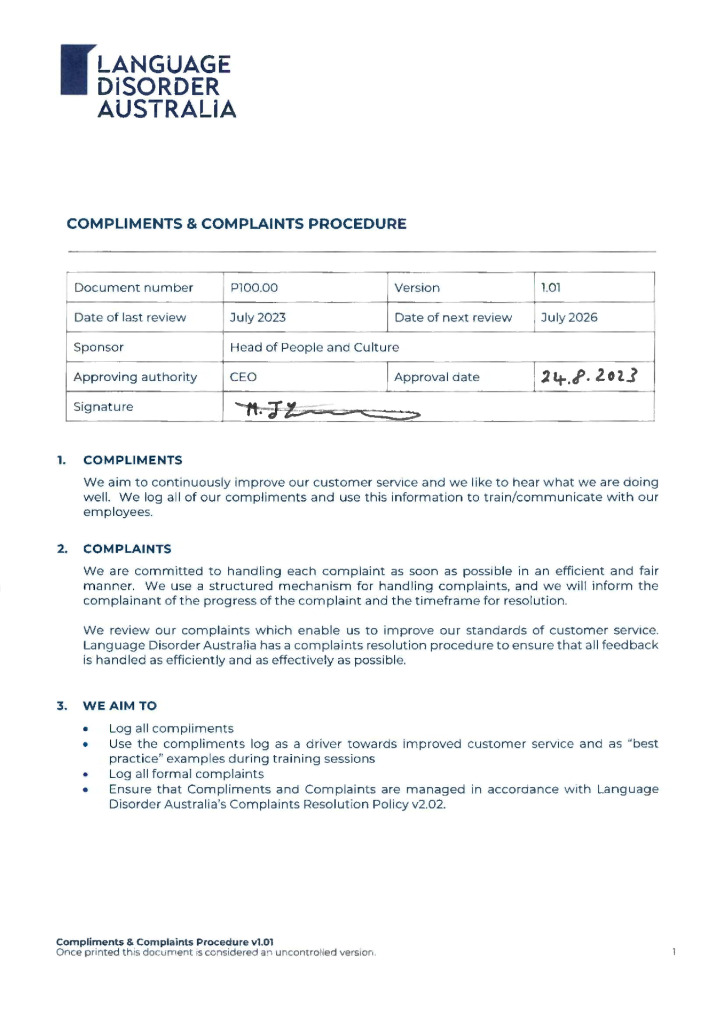- What is Language Disorder?
Language Disorder impacts a child’s ability to understand and use language.
Language Disorder is a neurodevelopmental disability that impacts a child’s ability to understand and use language. It impacts children and young people’s everyday social interactions and education.
What is Language Disorder? - Bright Door Clinics
- Mancel College
- School Support Services
Every child deserves the chance to succeed at school.
Getting a good start in school provides the foundation for a child’s learning and development for the rest of their lives.
School Support Services
How to provide feedback
We will respond to your compliments or concerns as soon as we receive them, with every effort to provide the best service standards.
In keeping things as simple and easy to use, to make a compliment or complaint you can simply contact us through one of the following:
- feedback@languagedisorder.org.au
- 1300 881 763
- Feedback Form
Please tell us if you need any support in providing feedback. We can help you to make contact and, if needed, contact you in a way that is convenient for you.
Who can provide feedback?
Anyone who receives a service from Language Disorder Australia, someone on their behalf, or anyone who is directly affected by our decisions or actions.
This includes:
- anyone who receives a service or support from Language Disorder Australia (or an individual on their behalf)
- individuals who may be affected by Language Disorder Australia decisions and actions
- contractors and partner organisations
What is a complaint?
A complaint is when you disagree with our service or a decision we have made. For example:
- an instance of our service delivery was poor
- failing to do something which we had agreed
- Language Disorder Australia giving wrong or misleading information
- our service standards were not met, or policies were not followed correctly
- inappropriate behaviour or lack of customer care provided by a member of staff or a contractor
Language Disorder Australia will review all complaints fairly and confidentially. Where complaints are received anonymously, Language Disorder Australia will record and review with the information that has been provided. Although, individual outcomes in anonymous complaints may be limited.
Detailed compliments and complaints procedure
1. COMPLIMENTS
We aim to continuously improve our customer service and we like to hear what we are doing well. We log all of our compliments and use this information to train/communicate with our employees.
2. COMPLAINTS
We are committed to handling each complaint as soon as possible in an efficient and fair manner. We use a structured mechanism for handling complaints, and we will inform the complainant of the progress of the complaint and the timeframe for resolution.
We review our complaints which enable us to improve our standards of customer service. Language Disorder Australia has a complaints resolution procedure to ensure that all feedback is handled as efficiently and as effectively as possible.
3. WE AIM TO
- Log all compliments
- Use the compliments log as a driver towards improved customer service and as “best practice” examples during training sessions
- Log all formal complaints
- Ensure that Compliments and Complaints are managed in accordance with Language Disorder Australia’s Complaints Resolution Policy v2.01.
4. PROCEDURE
4.1 Compliments
Our compliments procedure logs all compliments that we receive. We receive compliments in many forms – by phone, in person, by email, on our website, by letter or via our feedback form. Our compliments log is maintained and reviewed by the Executive Assistant to the Chief Executive Officer of Language Disorder Australia and compliments are used as examples of “best practice” whilst training staff and for continuous improvement.
4.2 Complaints
Our complaints procedure has four stages. Prior to the formal procedure being invoked, the individual making the complaint is encouraged to contact the staff member who will first try to solve the problem informally.
4.3 Self-resolution (within seven working days of a complaint being identified)
Where the complainant feels comfortable doing so, they should attempt to seek a resolution to the complaint themselves with the person/persons involved. The purpose of self-resolution is to resolve the matter quickly, avoid escalation of complaints, to produce a positive result for the maximum number of parties and to encourage a culture where honest and constructive communication is valued between all. Language Disorder Australia does not tolerate anyone behaving in a confrontational, aggressive or abusive way in the pursuit of addressing a complaint.
However, the informal approach may not always be appropriate and, in these situations, the individual making the complaint or the organisation may trigger the formal procedure.
Our complaints procedure records all complaints that we receive. We receive complaints in many forms – by phone, in person, by email, on our website or by letter. This procedure may also be used by employees. Assistance will be provided to those complainants who let us know if they are unable to put their complaint in writing.
- Speak to a member of the Language Disorder Leadership Team
- Phone: (07) 3378 8625
- Email: feedback@languagedisorder.org.au
- Website feedback form
- Or in writing to: Feedback at Language Disorder Australia, Level 3, 88 Jephson Street, Toowong, Queensland, 4066
5. THE FOUR STAGES OF THE FORMAL COMPLAINTS PROCEDURE
5.1 Stage 1
We will acknowledge receipt of a complaint about Language Disorder Australia within 24 hours of receipt. The complaint will be logged in Language Disorder Australia’s Complaints Register, and a complaint file will be started. This will then be passed to the relevant Executive Leadership Team Member. The Executive Leadership Team Member will investigate the complaint and respond in writing within 7 working days of receipt of the complaint.
5.2 Stage 2
Complainants with a serious complaint about our service, or who have a complaint that was not resolved at Stage 1, may request to escalate the complaint, via any form (e.g., email or phone call). The CEO will investigate the complaint and respond within 10 working days of receipt of the escalation of the complaint. All records will be logged in the Complaints Register.
5.3 Stage 3
Complainants who have a complaint that was not resolved at Stage 2, may request to escalate the complaint via any form (e.g., email or phone call). The Chair of the Board will investigate the complaint and the outcome of each stage of the complaints process. The Chair of the Board will write to the complainant with the outcome of the investigation within 21 working days of receipt of the escalation and this decision is final. All records will be logged in the Complaints Register.
6. REVIEW
6.1 This policy is due to be reviewed three years from the date of approval.
Language Disorder Australia Feedback Form







